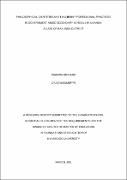| dc.contributor.author | Waiswa, Richard | |
| dc.date.accessioned | 2022-02-11T12:42:06Z | |
| dc.date.available | 2022-02-11T12:42:06Z | |
| dc.date.issued | 2021-03 | |
| dc.identifier.citation | Waiswa, Richard (2021) Philosophical identities and teachers’ professional practices in government aided secondary schools in Uganda: a case of Kayunga district | en_US |
| dc.identifier.uri | https://kyuspace.kyu.ac.ug/xmlui/handle/20.500.12504/498 | |
| dc.description | xiv, 99 p. ; | en_US |
| dc.description.abstract | The purpose of this study was to establish the relationship between Philosophical identities and teachers’ professional practices in government aided secondary schools in Kayunga district. Its objectives were to: explore on how personal life skills contribute to teachers’ professional practices, establish whether the teachers’ ethical values contribute to their professional practices and examine the relationship between subject mastery of Philosophy of Education and teachers’ professional practices. A cross- sectional survey design was employed. Qualitative and quantitative approaches were used in the study. A total of 152 respondents who were professional teachers participated and were selected by purposeful sampling technique. Self- administered questionnaires, face- to-face interviews and documentary analysis were used to collect data. Quantitative data was analyzed using Pearson Product Moment of correlation coefficient and the qualitative data was analyzed by cording, sorting similar responses and summarizing them according to the themes, codes tables, frequencies and percentages. Findings showed that personal life skills enhance teachers’ professional practices. The teachers’ ethical values contribute to teachers’ professional practices. Findings also revealed that there was a statistically significant relationship (r =.658, p = .000) between subject mastery of Philosophy of Education and teachers’ professional practices. It was concluded that personal life skills and ethical values developed by studying Philosophy of Education contribute to teachers’ professional practices. Some professional secondary school teachers failed to master Philosophy of Education. This is because Philosophy of Education was seen as difficult, with too much content and slightly contributes to their professional practices. Professional teachers appreciate the need and contribution of ethical values developed by studying Philosophy of Education to their professional practices. It was also concluded that Philosophical Identities enhances teachers’ professional practices. The study recommends that professional teachers have to constantly exercise their personal life skills and ethical values in order to effectively exhibit their professional practices. The Curriculum designers revisit the content of Philosophy of Education so as to suit the needs of secondary school teachers and be taught either in second or third year or both as an independent course for learners to benefit from the course. | en_US |
| dc.language.iso | en | en_US |
| dc.publisher | Kyambogo University | en_US |
| dc.subject | Philosophical identities | en_US |
| dc.subject | Teachers’ professional practices | en_US |
| dc.subject | Schools | en_US |
| dc.subject | Uganda | en_US |
| dc.title | Philosophical identities and teachers’ professional practices in government aided secondary schools in Uganda: a case of Kayunga district | en_US |
| dc.type | Thesis | en_US |

